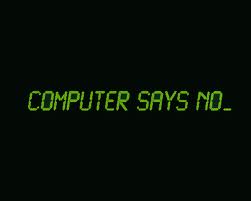Last time, I wrote about Dave Fishwick and his one man bank the Bank of Dave. Since then, I’ve enjoyed reading about Dave and his exploits.
As Dave’s enthusiastic charm begins to fade from memory, I’m no less convinced that the great British public are ready for a pretty hefty change when it comes to financial services and business finance in particular, but I do think we perhaps need a dose of realism when it comes to who should be able to borrow money or easily find a small business loan.
There’s an interesting post called Bank of Dave: credit ratings do us no credit over at www.realbusiness.co.uk. In it, Joe Carstairs – of Funding Options – uses the story of Tariq to consider the role of credit checks when it comes to lending and borrowing money.
Tariq, a local Burnley caterer who Dave lent money to, needed a Halal loan to buy new machinery for his business. He was facing difficulties because of a blot on his credit history that arose over a mobile phone contract several years ago.
When Tariq’s case was reviewed, a sharp intake of breath was followed by Dave’s Financial man – also called Dave – saying, “We can’t help every application that comes in.”
It seems that even Dave’s own team hadn’t entirely grasped his can-do attitude by then and, lo and behold, Dave did lend some of the money that Tariq required, Tariq repaid the loan and all was well.
So, that should be the end of credit scores and ratings histories yes?
No, not quite.
In his post, Joe Carstairs argues that:
“The reality is that we are still yet to emerge from one of the deepest recessions this country has ever seen, and many businesses and individuals will come out of it with a blot on their credit history.
Businesses that had one of their key customers go bust; individuals who lost their jobs. Unfortunately, bad things happen to good people and good businesses.”
I wholeheartedly agree. I also agree that it was great that Dave could help Tariq out. I also agree that credit scores need to be less rigid and less black and white…
But I also think it is important we don’t get carried away. The global financial crisis that has brought the world to its knees began, in no small way, because of loans that were promoted to people who really couldn’t afford them.
There is a line between the unlucky person who’s hampered by a credit history they’ve overcome and the person who, for their own benefit, should not be taking on more debt. Unfortunately, it’s a very fine line, and one that’s easy to get wrong.
So what’s the answer.
Well, in my opinion, it’s not to say goodbye to credit evaluation entirely. Done properly, it is a very useful tool that not only helps to protects investors money but helps prevent small businesses leveraging themselves to dangerous levels.
Peer to business lending is based on everyday savers lending to everyday businesses – real people helping other real people, if you like. But just because it’s connecting savers and borrowers it doesn’t mean those savers don’t want to get their money back.
In Burnley, they were lucky. Dave can afford to underwrite his loans, and that’s great. In most cases, though, investors are stumping up their own cash and – quite rightly – expecting a good rate of return on their investment.
We think that rigorous credit evaluation has a vital role to play in a successful lending economy. We think it should be academically sound and as up to date as possible and we think it should be regularly reviewed and updated to take the latest circumstances into account.
But we also, and this is really important, believe in flexibility. The time for “the computer says no” is over. These are real people, real businesses at stake and they deserve a real person to look at their case.
So whilst there is a lot to be said for efficient online processes, there’s room for a personal touch every now and then too. It’s about combining the best of both worlds and it’s about the human side of business lending.

